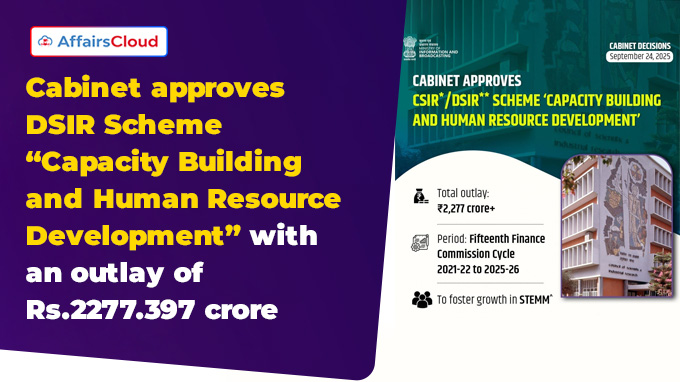In September 2025, the Union Cabinet headed by Prime Minister (PM) Narendra Modi, approved the Department of Scientific and Industrial Research / Council of Scientific and Industrial Research (DSIR/CSIR) Scheme on “Capacity Building and Human Resource Development (CB&HRD)”.
Exam Hints:
- What? Capacity Building and Human Resource Development
- Outlay: Rs. 2277.397 cr
- Period: 15th FC (2021–22 to 2025–26)
- Sub-schemes: 4 – Doctoral and Postdoctoral Fellowships; ERS, ESS, BFP; Promotion and Recognition of Excellence through the Award Scheme; Promoting knowledge sharing through the Travel and Symposia Grant Scheme
- Implemented by: CSIR under DSIR
- Objective: Strengthen India’s STEMM workforce and boost innovation capacity
Key Highlights:
Purpose: The initiative provides a wide platform for young, enthusiastic researchers aspiring to build careers in universities, industry, national R&D (Research and Development) laboratories and academic institutions.
- It is guided by eminent scientists and professors, the scheme will foster growth in Science, Technology & Engineering, Medical, and Mathematical Sciences (STEMM).
Outlay and Period: The scheme has been approved for the period of the 15th Finance Commission Cycle (FCC) 2021-22 to 2025-26 with a total outlay of Rs.2,277.397 crore (cr).
Implementation: It is implemented by the CSIR and will cover all R&D institutions, national laboratories, Institutes of National Importance, Institutes of Eminence, and Universities across the country.
Research Capacity: The scheme plays an important role in the achievement of the Sustainable Development Goals (SDGs) for the S&T (Science & Technology) sector in India by increasing the researchers per million (mn)population.
Sub-schemes: This umbrella CB&HRD scheme has the following four sub-schemes:
- Doctoral and Postdoctoral Fellowships: It provides research support and training to bright young researchers to develop into independent scientists and scholars.
- The Extramural Research Scheme (ERS), the Emeritus Scientist Scheme (ESS), and the Bhatnagar Fellowship Programme (BFP):
- The ERS of the Ministry of Ayush (MoA) is designed to encourage R&D in priority areas based on disease burden in alignment to the National Health programme.
- The ESS provide financial assistance and a research/teaching platform to outstanding scientists and academicians after they have retired or are about to retire.
- The objective of Bhatnagar Fellowship is to recognize and enable outstanding scientists to pursue excellence in scientific research and innovative technology development.
- Promotion and Recognition of Excellence through the Award Scheme.
- Promoting knowledge sharing through the Travel and Symposia Grant Scheme: The Scheme provides financial support to universities, colleges, government bodies, and societies to organize scientific events—such as seminars, conferences, and workshops.
Innovation Progress: India has improved its position to 39th in the Global Innovation Index 2024 released by World Intellectual Property Organization (WIPO), reflecting steady advancement in innovation and technology.
- India now ranks among the top three globally in scientific publications, as per National Science Foundation (NSF), USA (United States of America) data, highlighting its growing contribution to global research.
About Council of Scientific and Industrial Research (CSIR):
The CSIR, known for its cutting edge R&D knowledge base in diverse S&T areas, is a contemporary R&D organization. CSIR has a dynamic network of 37 national laboratories, 39 outreach centres, 1 Innovation Complexes, and three units with a pan-India presence.
Director General (DG): Dr. N.Kalaiselvi
Headquarters: New Delhi, Delhi





